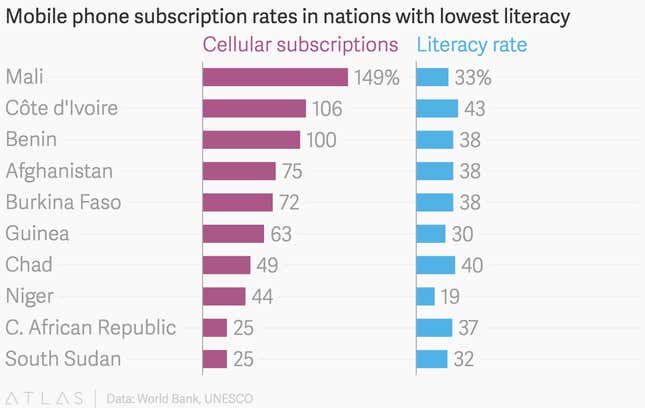Hi, Quartz Africa readers!
[insertSponsor]
Learning from innovators
With better phone connections, convenient email, messaging apps and Google, it’s easier than ever as a journalist to get to know a subject. So well in fact you often feel you know all you need. But nothing quite matches spending time and interacting with your subject. That hit me at this year’s Quartz Africa Innovators Summit. We were joined by seven of the innovators on our 2016 list in Nairobi last week. Each person told a unique story and inspired with a passion and insight that a Whatsapp connection can never quite capture.
The importance of originality, creativity and determination against the odds shone through time and again. Burkina Faso hip hop activist Smockey had just learned his studio had again been razed to the ground but still took time to talk us through the importance of giving the youth of his country a voice in the face of dangers to his own life. Filmmaker Wanuri Kahiu told us science fiction wasn’t foreign to Africans or our culture. Ciiru Waweru, whose FunKidz makes furniture for children, pointed out manufacturing was vital to Africa’s future rather than importing every item we use in our lives. Winnifred Selby, the 21-year old founder of Ghana Bamboo Bikes and already a philanthropist, called on Africa’s youth not to wait on their governments to create jobs. Selby is qualified to comment, she started a company manufacturing bikes at 15, and now employs dozens of people.
Funding entrepreneurs and research was a common thread through most of the discussions. Cameroonian scientist Wilfred Ndifon pushed us all to think more strategically about supporting science research on the continent. Matsi Modise, a venture capitalist from Soweto, reminded us there remains a huge funding gap on the continent. Our keynote speaker Agosta Liko, founder of Kenya’s PesaPal worried that external funding coming into Africa focuses too much on the poor and fails to support businesses that serve the middle class.
Watch here to see the full streaming of the event.
Yinka Adegoke, Quartz Africa editor
Five stories from this week
Kenya is pressuring expat NGO workers to go home. With its good weather, political stability, and English-speaking population, Kenya is a popular destination for NGOs. However a perception is taking hold that these highly visible workers are being very well compensated but qualified Kenyans are not being paid as much. Now, as Lily Kuo explains, the government is getting involved.
Is the new African Union visa-free passport ready for primetime? Not quite. Yomi Kazeem welcomes its launch but thinks it doesn’t solve many systemic problems with moving around the continent as an African. And Cristian D’Orsi argues the barriers to actually implementing the new passport may be insurmountable.
M-Pesa is taking on banks with a debit card. Safaricom, parent of the M-Pesa mobile money platform, is eying a piece of the $13.5 billion in annual transactions in Kenya’s payment cards sector, writes Joshua Masinde.
Africans win one round in 1000-round tiresome-narrative battle. The “Skinny white muzungu with long angel hair” Louise Linton has pulled her self-published book from Amazon. It comes after she received a barrage of criticism, led by young Africans on social media, about her exaggerated account of her time as a volunteer in Zambia.
Somalis love books. As the war-weary Somalia slowly gains more stability, there has been an uptick in the number of festivals promoting books and the culture of reading across the Somali region, writes Abdi Latif Dahir. Three fairs in Hargeisa, Garowe and Mogadishu have become important places to expose Somalis to different writers and cultures across the region, Africa, and the world.
Chart of the week
You can measure illiteracy globally just by looking at mobile phone data.
New research shows how machine learning can turn mobile phone records into a high-resolution map of illiteracy in developing countries,
. The research predicted illiteracy rates with 70% accuracy from users’ mobile phone data and mapped it.

If we had a ‘Quote of the week’ section
“Is Uber in the US?”
Our Uber driver in Nairobi doesn’t think America is that great after all.
Other things we liked
Accra is Africa’s capital of cool. The New York Times highlights Ghana’s capital city in its travel section. It focuses on the buzzing art scene with the work of artists like El Anatsui and a choice of great hotels and restaurants.
Keep an eye on
We’ll find out this week if the Zimbabwean government will pay public workers including army and air force officers, nurses, doctors and police that were delayed because of its ongoing cash shortage. The country is still in the middle of ongoing protests against the Mugabe government with the #ThisFlag movement.
Our best wishes for a productive week ahead. Please send any news, comments, anti-Conradesque manuscripts and Accra flight tickets to africa@qz.com. You can follow us on twitter at @qzafrica for updates throughout the day.